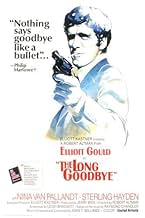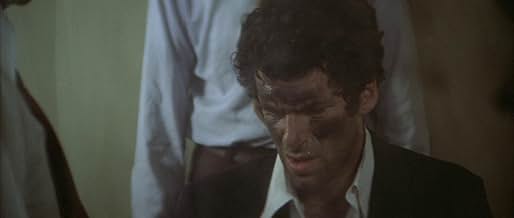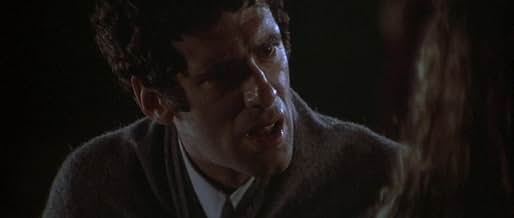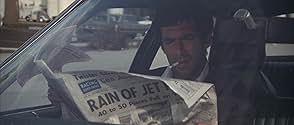Philip Marlowe, détective privé, aide un ami à se sortir d'affaire. Mais ce faisant, il se retrouve impliqué dans le meurtre de sa femme.Philip Marlowe, détective privé, aide un ami à se sortir d'affaire. Mais ce faisant, il se retrouve impliqué dans le meurtre de sa femme.Philip Marlowe, détective privé, aide un ami à se sortir d'affaire. Mais ce faisant, il se retrouve impliqué dans le meurtre de sa femme.
- Director
- Writers
- Stars
- Prix
- 2 victoires et 1 nomination au total
Stephen Coit
- Detective Farmer
- (as Steve Coit)
Vincent Palmieri
- Vince
- (as Vince Palmieri)
Pancho Córdova
- Doctor
- (as Pancho Cordoba)
Avis en vedette
The first time I saw this movie was back in the seventies and this was the film that won me over to Robert Altman's great works in the American cinema.
Granted, at the time of the movie's release Raymond Chandler purists naturally didn't appreciate the transformation his knight errant private eye underwent. But nowadays, the viewer must see the film for its great direction, terrific performances, Leigh Brackett's excellent screenplay and the fine cinematography. Not to mention simply the challenge of understanding a truly baffling plot. As in all of Altman's works, this one is peppered with offbeat characters and subtle (and some not-so subtle) situations that positively take you by surprise. As a maverick figure in Hollywood, Altman made sure "iconoclast" was stamped all over this film, it's a true nose-thumbing at every institution that Hollywood reveres; idealistic movie heroes, neat happy-ever-after endings, big budget spectacles, dependable money-making conventions and all around ass-kissing.
But the real treat here is, of course, Elliott Gould, and I don't believe that it's the best thing he's ever done on screen, as many think. He's certainly turned out even better performances than this one throughout the past 3 decades. But yet, in The Long Goodbye, Gould is just so much fun to watch, especially when he's being interrogated by the police or just muttering lines like, "He's got a girl, I got a cat" or "a melon convention" when he gives up trying to get his topless next-door neighbors' attention.
An interesting thing to note at the end of the film - we see the back shot of Marlowe walking away and that to me, was the private eye's closing shot, but then we have a front shot of Elliott Gould who begins playing his harmonica and then continues on up the road doing his little number, dancing a jig, etc. And to me that shows where Marlowe left off and where Gould takes over. So they weren't one and the same after all. Once again, a statement to those who would be too quick to take the Marlowe myth seriously.
The Long Goodbye is vintage Altman, a masterwork to be savoured forever.
Granted, at the time of the movie's release Raymond Chandler purists naturally didn't appreciate the transformation his knight errant private eye underwent. But nowadays, the viewer must see the film for its great direction, terrific performances, Leigh Brackett's excellent screenplay and the fine cinematography. Not to mention simply the challenge of understanding a truly baffling plot. As in all of Altman's works, this one is peppered with offbeat characters and subtle (and some not-so subtle) situations that positively take you by surprise. As a maverick figure in Hollywood, Altman made sure "iconoclast" was stamped all over this film, it's a true nose-thumbing at every institution that Hollywood reveres; idealistic movie heroes, neat happy-ever-after endings, big budget spectacles, dependable money-making conventions and all around ass-kissing.
But the real treat here is, of course, Elliott Gould, and I don't believe that it's the best thing he's ever done on screen, as many think. He's certainly turned out even better performances than this one throughout the past 3 decades. But yet, in The Long Goodbye, Gould is just so much fun to watch, especially when he's being interrogated by the police or just muttering lines like, "He's got a girl, I got a cat" or "a melon convention" when he gives up trying to get his topless next-door neighbors' attention.
An interesting thing to note at the end of the film - we see the back shot of Marlowe walking away and that to me, was the private eye's closing shot, but then we have a front shot of Elliott Gould who begins playing his harmonica and then continues on up the road doing his little number, dancing a jig, etc. And to me that shows where Marlowe left off and where Gould takes over. So they weren't one and the same after all. Once again, a statement to those who would be too quick to take the Marlowe myth seriously.
The Long Goodbye is vintage Altman, a masterwork to be savoured forever.
I like the hard-to-solve mystery we get here. Actually, they don't even come close to giving us enough clues to solve it, hence the difficulty. But in that we feel we're up against it like the protagonist, detective Phil Marlowe, played by Elliot Gould.
Times have really changed for Marlowe since 1946, when he was played by Humphrey Bogart. Then he was cool, implacable, wore a fedora a lot, and wound up with babe Lauren Bacall. That was the only strain of the plot viewers could follow. There were some dead bodies, smoking guns, and tough questions from cops along the way.
In this movie it's 1973, and Marlowe still think he's cool but that opinion is not so widespread this time - he's being played for a sucker by at least half the cast, including a longtime friend, and his own cat. He unravels the mystery mostly out of a lack of having anything better to do, which he clearly stood in need of.
Director Robert Altman follows his own ideas about how to communicate visually. Like when he changes scene to a hospital, he doesn't do any kind of establishing long shot, he shows a closeup of a light over a patient's bed. His montages create a kind of equivalent of our human experience, where we use our minds to focus on detail. He usually winds up with scenes that feel like we're watching something actually happen. But he does know how to use visuals for dramatic power when he wants, as the ending makes clear.
Some of the performances he gets from actors are amazing, like Mark Rydell as psychotically dangerous gangster Marty Augustine. The way he works himself into a rage with his rants changes gears from funny to frightening at high speed, and I can't believe it didn't influence Joe Pesci's performance in "Goodfellas."
Not everything works here, like Gould smearing fingerprint ink on his face then breaking into Al Jolson at police headquarters, but on the whole a fairly engrossing take on detective mysteries.
Times have really changed for Marlowe since 1946, when he was played by Humphrey Bogart. Then he was cool, implacable, wore a fedora a lot, and wound up with babe Lauren Bacall. That was the only strain of the plot viewers could follow. There were some dead bodies, smoking guns, and tough questions from cops along the way.
In this movie it's 1973, and Marlowe still think he's cool but that opinion is not so widespread this time - he's being played for a sucker by at least half the cast, including a longtime friend, and his own cat. He unravels the mystery mostly out of a lack of having anything better to do, which he clearly stood in need of.
Director Robert Altman follows his own ideas about how to communicate visually. Like when he changes scene to a hospital, he doesn't do any kind of establishing long shot, he shows a closeup of a light over a patient's bed. His montages create a kind of equivalent of our human experience, where we use our minds to focus on detail. He usually winds up with scenes that feel like we're watching something actually happen. But he does know how to use visuals for dramatic power when he wants, as the ending makes clear.
Some of the performances he gets from actors are amazing, like Mark Rydell as psychotically dangerous gangster Marty Augustine. The way he works himself into a rage with his rants changes gears from funny to frightening at high speed, and I can't believe it didn't influence Joe Pesci's performance in "Goodfellas."
Not everything works here, like Gould smearing fingerprint ink on his face then breaking into Al Jolson at police headquarters, but on the whole a fairly engrossing take on detective mysteries.
Private investigator Philip Marlowe is approached by a friend, Terry Lennox, who is in a bit of a jam. Marlowe helps him get to Mexico but the next day his friend's wife turns up dead. The police hold Marlowe but then release him once Terry Lennox is found dead in Mexico - suicide. To the cops it is an open-and-shut case of murder-suicide but Marlowe doesn't believe that to be the case. Marlowe then is hired by the wife of wealthy author Roger Wade to find her husband. The Wades were neighbours of the Lennoxes. A powerful mob boss also leans on him to find the large sum of money Terry Lennox was transporting for him. Could all these events be connected?
Robert Altman directs a movie based on a Raymond Chandler novel, and it's a mixed bag.
Starts off very well with some humorous scenes and dialogue and a fair amount of intrigue. The middle-to-end sections lack focus, however, and, while it is never dull, the movie feels like it is drifting to a lacklustre conclusion. The intrigue just seems to get sucked out of the movie in that segment. In addition, the theme song gets played in just about every situation and in various forms - it gets very irritating, very quickly.
Ends well though, with a good twist and a powerful conclusion.
A new take on Philip Marlowe from Elliott Gould - he is hardly Humphrey Bogart and he's not trying to be. Altman's Philip Marlowe is the dishevelled, anti-social chain-smoking anti-hero rather than the suave, confident hero that Bogart portrayed. For the most part, it works, though at times I wished for the coolness and wise-cracks of Bogie.
Supporting cast are fine. Sterling Hayden is great as the larger-than-life, Ernest Hemingway/John Huston-esque Roger Wade.
Not the Philip Marlowe of the Bogart movies, but it'll do.
Robert Altman directs a movie based on a Raymond Chandler novel, and it's a mixed bag.
Starts off very well with some humorous scenes and dialogue and a fair amount of intrigue. The middle-to-end sections lack focus, however, and, while it is never dull, the movie feels like it is drifting to a lacklustre conclusion. The intrigue just seems to get sucked out of the movie in that segment. In addition, the theme song gets played in just about every situation and in various forms - it gets very irritating, very quickly.
Ends well though, with a good twist and a powerful conclusion.
A new take on Philip Marlowe from Elliott Gould - he is hardly Humphrey Bogart and he's not trying to be. Altman's Philip Marlowe is the dishevelled, anti-social chain-smoking anti-hero rather than the suave, confident hero that Bogart portrayed. For the most part, it works, though at times I wished for the coolness and wise-cracks of Bogie.
Supporting cast are fine. Sterling Hayden is great as the larger-than-life, Ernest Hemingway/John Huston-esque Roger Wade.
Not the Philip Marlowe of the Bogart movies, but it'll do.
Usually smoking, and sometimes smirking, Elliott Gould mumbles and stumbles his way through Altman's re-invention of this gumshoe novel by Raymond Chandler. The film's unexpectedly interesting ending suggests a good story, but you'd never know it from the film's plot, which rambles and meanders, seemingly without purpose, a pointless talk-fest wherein Marlowe interacts with the cops, a femme fatale, a buddy who wants to disappear, and assorted hoods and mobsters. It's all rather sordid and seedy as you would expect, except that it's brought up to date, for 1973, and in its "hipness" and sophistication becomes something of a parody of 1940's private-eye flicks. Gould's Marlowe is annoyingly smug, with a too casual manner. And I found none of the other characters to be sympathetic or likable.
The dialogue and the acting are stilted and self-conscious. In one party sequence that takes place on the beach, Dr. Verringer (Henry Gibson) insists that he get his money. The guests stand around, as if they are movie extras brought in for this one day of shooting. The viewer can easily imagine microphones just over the heads of the principal actors, and personnel just off-screen, waiting for Altman to yell: "Cut". Along with other scenes, it looks forced and staged.
The film's best attribute is its cinematography. I especially like the sequence showing human figures retreating into the surf at night. Combined with the sound of ocean waves, it makes for an interesting segment.
Some viewers love this film because of Altman's direction and Gould's performance. Others hate it because it so deviates from Chandler's original story. I personally did not like the film, mostly because of Marlowe, himself, and because of the tangled and convoluted plot, populated by loquacious characters who I found totally not interesting.
The dialogue and the acting are stilted and self-conscious. In one party sequence that takes place on the beach, Dr. Verringer (Henry Gibson) insists that he get his money. The guests stand around, as if they are movie extras brought in for this one day of shooting. The viewer can easily imagine microphones just over the heads of the principal actors, and personnel just off-screen, waiting for Altman to yell: "Cut". Along with other scenes, it looks forced and staged.
The film's best attribute is its cinematography. I especially like the sequence showing human figures retreating into the surf at night. Combined with the sound of ocean waves, it makes for an interesting segment.
Some viewers love this film because of Altman's direction and Gould's performance. Others hate it because it so deviates from Chandler's original story. I personally did not like the film, mostly because of Marlowe, himself, and because of the tangled and convoluted plot, populated by loquacious characters who I found totally not interesting.
Much like the 30's jazz music that opens the movie, The Long Goodbye appears on the surface to take its cue from classic film noir. No surprise here, it is based after all on the Raymond Chandler novel by the same name, Chandler as iconic a figure in the noir realm as you're likely to get and responsible for some of the most distinctly classic moments of the genre (Double Indemnity, The Big Sleep, also Strangers on a Train for Hitchcock). But instead of rehashing styles and themes from a bygone era of film-making, Altman instead takes Chandler's film noir of wandering, and hangs on it his own unique take.
Elliot Gould is Phillip Marlowe. Scruffy, sardonic and alienated private dick with a smart mouth and a cigarette eternally glued to his lips. Altman's twist? He's cool but not the suave kind that would impress dames in the 40's, the Bogart kind. He seems constantly out of place, a bit phased, doomed to observe and comment in his witty repartee on what's going on around him or just let the chips fall where they may. And they do.
Chandler's story is one of his very best. All the staples of noir are present, simultaneously fulfilling the promise of a Phillip Marlowe film and in the same time preparing the ground for Altman's take on it; murder, missing money, unhappy marriages, a private eye hired to investigate. The works. Sprawling and convoluted like the best of noirs usually are. The dialogue crackling with inventiveness, shedding tough guy lingo for a sense of playfulness, rolling in and out of the picture in a stream-of-consciousness way.
Some of the twists and characters seem to carry a sense of seething malice, a fleeting glimpse on the seamy underbelly of the Great American Beast, the scars and ugliness of Hollywood showing behind a faded facade of glamour, an escalating creepiness factor that recalls the later works of David Lynch, predating him by a good number of years as it does. The mousey Dr. Verringe and the whole clinic subplot reminded me of Lost Highway for example.
What really elevates The Long Goodbye in another level is Altman's direction and he has Vilmos Zsigmond with him. This is only my second Altman picture (after McCabe and Mrs. Miller) but 2 hours in his presence were enough to leave an indelible sense that I'm watching the work of a master on top of his craft. Altman's camera is always on the move, slowly panning and floating in and out of the frame, picking up details, guiding the eye but never getting in the middle of the story or screaming for attention. The whole thing has a natural, subdued feel to it, what with the unobtrusive lighting and bleached-out, hazy look; no glitz or glamour here. Only the faded, long-gone impression of it. This is a world we are enmeshed in that surrounds from all sides with hazy reflection.
The Long Goodbye is both a fantastic and somewhat hidden gem of 70's crime cinema and also one of the missing links in the evolution of noir, all the way from Sunset Blvd. to Mullholland Drive. You must visit at some point.
Elliot Gould is Phillip Marlowe. Scruffy, sardonic and alienated private dick with a smart mouth and a cigarette eternally glued to his lips. Altman's twist? He's cool but not the suave kind that would impress dames in the 40's, the Bogart kind. He seems constantly out of place, a bit phased, doomed to observe and comment in his witty repartee on what's going on around him or just let the chips fall where they may. And they do.
Chandler's story is one of his very best. All the staples of noir are present, simultaneously fulfilling the promise of a Phillip Marlowe film and in the same time preparing the ground for Altman's take on it; murder, missing money, unhappy marriages, a private eye hired to investigate. The works. Sprawling and convoluted like the best of noirs usually are. The dialogue crackling with inventiveness, shedding tough guy lingo for a sense of playfulness, rolling in and out of the picture in a stream-of-consciousness way.
Some of the twists and characters seem to carry a sense of seething malice, a fleeting glimpse on the seamy underbelly of the Great American Beast, the scars and ugliness of Hollywood showing behind a faded facade of glamour, an escalating creepiness factor that recalls the later works of David Lynch, predating him by a good number of years as it does. The mousey Dr. Verringe and the whole clinic subplot reminded me of Lost Highway for example.
What really elevates The Long Goodbye in another level is Altman's direction and he has Vilmos Zsigmond with him. This is only my second Altman picture (after McCabe and Mrs. Miller) but 2 hours in his presence were enough to leave an indelible sense that I'm watching the work of a master on top of his craft. Altman's camera is always on the move, slowly panning and floating in and out of the frame, picking up details, guiding the eye but never getting in the middle of the story or screaming for attention. The whole thing has a natural, subdued feel to it, what with the unobtrusive lighting and bleached-out, hazy look; no glitz or glamour here. Only the faded, long-gone impression of it. This is a world we are enmeshed in that surrounds from all sides with hazy reflection.
The Long Goodbye is both a fantastic and somewhat hidden gem of 70's crime cinema and also one of the missing links in the evolution of noir, all the way from Sunset Blvd. to Mullholland Drive. You must visit at some point.
Le saviez-vous
- AnecdotesThe location for Roger Wade - Sterling Hayden's home was actually Robert Altman's home at the time.
- GaffesDuring the scene where Marlowe is chasing Mrs. Wade in her top-down Mercedes 450 SL convertible, the car goes from having head rests to having no head rests in various shots.
- Citations
Philip Marlowe: Nobody cares but me.
Terry Lennox: Well that's you, Marlowe. You'll never learn, you're a born loser.
Philip Marlowe: Yeah, I even lost my cat.
- ConnexionsEdited into El adios largos (2013)
- Bandes originalesThe Long Goodbye
by John Williams and Johnny Mercer
Performed by The Dave Grusin Trio, Jack Sheldon, Clydie King, Jack Riley, Morgan Ames, Aluminum Band, The Tepoztlan Municipal Band
Meilleurs choix
Connectez-vous pour évaluer et surveiller les recommandations personnalisées
Détails
- Date de sortie
- Pays d’origine
- Langues
- Aussi connu sous le nom de
- Le privé
- Lieux de tournage
- 2178 High Tower Drive, Hollywood, Los Angeles, Californie, États-Unis(Marlowe's residence)
- sociétés de production
- Consultez plus de crédits d'entreprise sur IMDbPro
Box-office
- Budget
- 1 700 000 $ US (estimation)
- Brut – à l'échelle mondiale
- 27 504 $ US
Contribuer à cette page
Suggérer une modification ou ajouter du contenu manquant


































